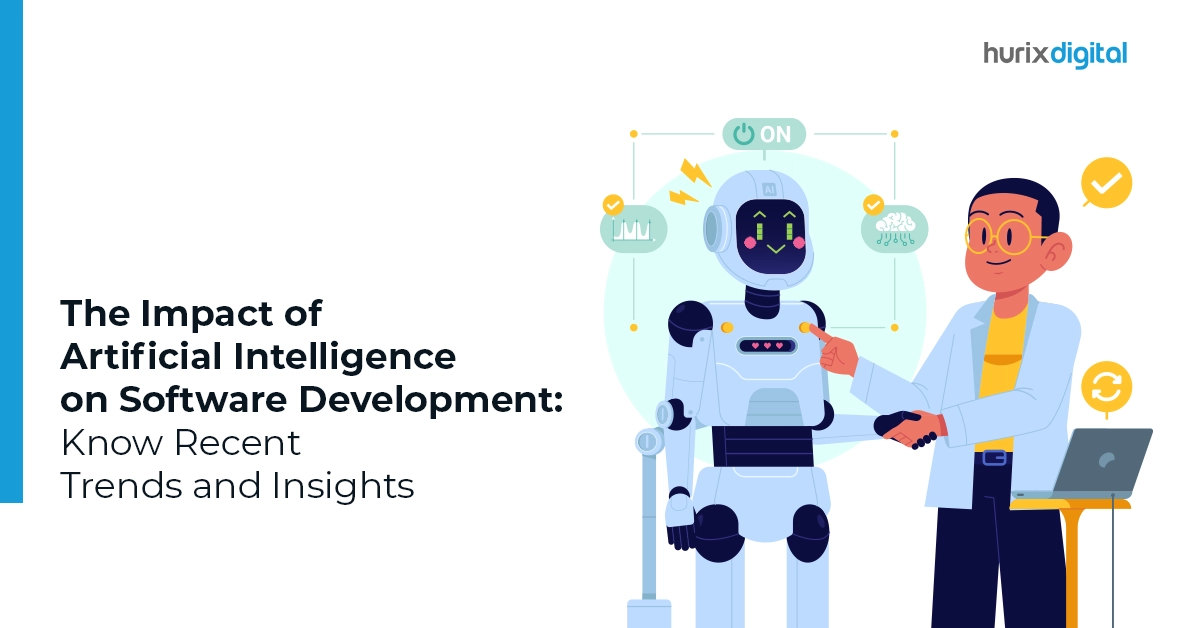
The Impact of Artificial Intelligence on Software Development: Know Recent Trends and Insights
Summary
Learn about the latest trends in AI and its impact on software development. This article explores how artificial intelligence is transforming the software development landscape.
Artificial intelligence (AI) is revolutionizing various industries, including software development. The turnaround time for building functional software products has been significantly reduced, though manual efforts are still needed to conceptualize, create, and test them.
In this post, we will examine recent trends and insights into the impact of AI on making the software development process more productive and efficient. Let’s dive in!
Table of Contents:
- Artificial Intelligence in Software Development: The Concept
- Recent Trends in AI Software Development
- Way Forward
Artificial Intelligence in Software Development: The Concept
AI is a technology that simulates the ability and intelligence of the human mind to make decisions and solve problems with algorithms that incisively analyze and process large datasets.
AI can establish data patterns promptly and prevent excessive time delays. The algorithms are subjected to supervised learning to perform complex jobs like predictive analytics and natural language processing (NLP).
AI software development accomplishes outcomes faster primarily by automating repetitive tasks, expediting tedious processes, and tracking potential bugs before they snowball. The developer’s workload is significantly reduced as feasible strategies for scripting complex codes or fixing bugs are made available by AI. The time to extensively research and test alternate solutions is saved, which makes the software reach the market faster.
The immense benefits offered by AI are catalyzing the expansion of its global market at a CAGR (compound annual growth rate) of 37.3% with the size estimated to grow by 2030 to $1811.8 billion. The reputed firm PWC believes that AI’s integration into workflow will result in productivity improvement by 40% by 2035. Already, 48% of global businesses are leveraging data analytics, machine learning, and various AI tools to render data error-free and accurate.
Also Read: The Impact of AI and Automation on Workforce Development Trends
Recent Trends in AI Software Development
AI is emphatically impacting the software development landscape. This is evident from the recent trends that are discussed below:
1. Efficient Conceptualization and Execution of Project Roadmap
Generative AI is streamlining the compilation and design of software project blueprints. Project management software powered by AI is empowering software developers to identify potential bottlenecks and monitor progress in real-time.
As such, meeting the expectations and deadlines of clients is becoming easier. Developers are now executing more projects in a shorter span without compromising on quality.
2. Quicker Decision-Making through Analytical Insights
Software development’s success depends on meeting users’ expectations by incorporating the desired features and providing timely updates.
With AI, developers are now comprehensively analyzing data collected from customer surveys, user feedback, and market-dominating trends to create bespoke products. This also enables them to eliminate risks related to integrating features offering little usability and engaging in exhaustive fault tracking.
3. Expedited Fault Tracking
AI software developers are no longer manually testing and debugging codes. This is saving them time for more valuable jobs as AI algorithms are quickly identifying bugs and code flaws. Interestingly, the debugging phase is the most time-consuming in the traditional development process. AI axes this delay by almost 70% by promising higher accuracy in coding.
4. Fast-Tracking of Project Work
AI’s agile methodology and automation are making project management easier. AI is taking care of the entire spectrum, ranging from planning projects, designing, managing, and deploying resources, to testing and releasing.
NLP automatically generates codes by correctly understanding and interpreting instructions at a high level, or visual designs. This saves time, effort, and cost for >30% of software development teams.
AI project management software triggers notifications, alerts, and reminders to ensure that critical tasks are completed on time. Consequently, software architecture development and refining are getting more attention.
5. Ease of Developing Cross-Functional and Versatile Software
AI is facilitating the quick development of cross-industry and sophisticated software. AI allows developers to apply varied skills for building versatile apps for web and mobile, databases, and for other purposes. The AI-driven app development software tools integrate with existing workflows seamlessly. This makes it easier to create software with features that can cater to the needs of multiple industries dynamically.
6. Better Collaborative Approach
AI has taken collaboration to the next level by automating team communication. This is helping developers manage progress better with real-time inputs and effective resource management.
Gaining insights into a project workflow, eliminating delays, and rectifying discrepancies have become a breeze.
The best thing is that AI tools can be scaled up based on the complexity, size, and collaboration requirements of the project. Team members can be kept posted about peers’ progress in the project pipeline.
A unified dashboard view and algorithms that convert manually inputted text to data deciphered by machines make project management highly organized and seamless. Projects can be completed quickly and without errors.
7. Improvement in UX
AI allows the delivery of state-of-the-art software with cutting-edge features, which improves the user experience considerably. The advanced analytical features embedded in AI tools help isolate users’ pain areas, making it possible to work on features that have scope for improvement. Further, AI algorithms make it possible to intuitively adapt to users’ changing needs to keep the software relevant and functional.
8. Optimum Utilization of Resources
AI is speeding up resource mapping and allocation. As the project’s resource requirements can be calculated accurately and well in advance, development teams need not engage them in such mundane tasks.
Managing projects becomes efficient as resources can be utilized optimally in tandem with the allocation path suggested by AI tools. Bottlenecks can be pre-empted as the need for additional resources can be mapped in time.
9. Making Software Development More Cost-Effective
Software’s competitive edge is derived from its ability to reach targeted users affordably. With the introduction of AI, redundant costs can be decisively trimmed, cutting the need for iterative tasks.
The turnaround time to market becomes shorter, releasing capital for investing in software marketing campaigns. Overall, offshore or nearshore software development costs are much less than those of the conventional manual-intensive process.
Also Read: Advanced Techniques for Applying AI to Detect Website Anomalies and Bugs
Way Forward
The trends discussed above clearly manifest the huge impact Artificial Intelligence is having on software development. It is just the tip of the iceberg because huge investments are being made globally by software development firms to boost the usage of AI in the coming days. AI will continue to revolutionize the development process with more innovative interventions and automation.
At Hurix Digital, we endeavor to provide software development firms with the expertise needed to incorporate the explosive power of AI into the development process. Our experienced team will collaborate with offshore or nearshore teams to figure out the best and most cost-effective way to leverage AI to expedite software development.
Connect with us with your unique requirements to learn how we can provide you with decisive support in AI-powered software development.

Currently serving as the Vice President of Technology Delivery Operations at HurixDigital, a prominent global provider of digital content and technology solutions for publishers, corporations, and educational institutions. With over 16 years of experience spanning EdTech and various domains, I hold certification as a SCRUM Product Owner (CSPO). My expertise includes operations, finance, and adept people management skills.




